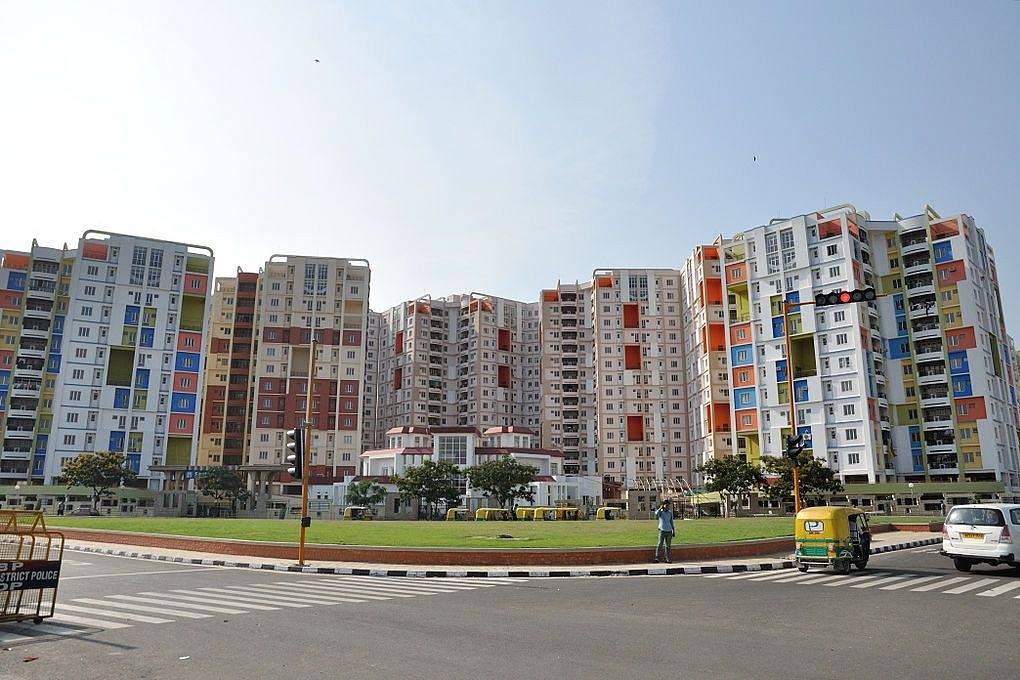Business
Tax Breaks Ain’t Enough: Home Prices Have To Crash By A Further 30-40 Per Cent For Buyers To Take Bait
- Land prices need to crash to enable more home buying, which means getting politicians and vested interests out of the business of controlling land supplies.

A residential property. (Biswarup Ganguly/Wikimedia Commons)
Despite a slowdown and weak pricing power in the real estate market, housing has become even more unaffordable, according to a Reserve Bank of India (RBI) survey. The study, which measures affordability by juxtaposing home prices against the average incomes of home loan borrowers, found that the price-to-income ratio has soared nationally from 56.1 per cent in March 2015 to 61.5 in the same month this year. Mumbai has – not unexpectedly – become the most unaffordable city in India, with its ratio rising from 64.1 to 74.4.
What this is clearly telling us is that the housing market is not going to revive anytime soon unless prices are drastically reduced, possibly by 30-40 per cent. If no cuts are offered in nominal terms to entice buyers, the same correction will have to happen by price stagnation over several years, which will lower inflation-adjusted costs by a similar magnitude.
Cutting real estate prices means cutting the price of land, since the costs of inputs – cement, sand, wood and fittings – are not over-priced or unrealistic.
Contrary to popular belief, the real problem in India’s housing market, especially in urban areas, is not availability of cheap land, but its artificial scarcity. This scarcity is engineered by a cabal of politicians and bureaucrats in cahoots with builders and developers to keep prices high. It is no secret that most black wealth is now held in real estate, and this is one reason why the benami owners do not want prices to fall – it reduces the value of bribes paid in real estate. They thus collaborate to keep land supplies restricted, either by delaying building permissions, or by disallowing vertical building through higher floor space indices.
This is also the reason why, despite the fact that the housing sector has been given all kinds of tax concessions in recent years, there is no significant uptick in purchases. Despite an improvement over two years ago, the inventory of unsold flats in India’s top seven cities is still worth 30 months of sales.
Currently, the following concessions are available for housing: a Rs 2 lakh deduction on interest payments on housing loans, and principal payments upto Rs 1.5 lakh annually; long-term capital gains on real estate sales are exempt from tax if re-invested in another house; in the interim budget of 2019-20, this concession of re-investment has been extend to two houses on capital gains upto Rs 2 crore; tax-free self-occupation benefits also extend to two homes.
Besides, there are interest rate subventions of affordable housing of 4 and 3 per cent for loans upto Rs 9 lakh and Rs 12 lakh, and Finance Minister Nirmala Sitharaman’s budget gave first-time home buyers interest payment deductions of upto Rs 3.5 lakh annually for homes costing upto Rs 45 lakh. To top it all, builders do not have to pay any income tax on profits earned from affordable housing projects.
Given the sheer amount of tax benefits given for housing, one should wonder why people aren’t rushing to buy their homes.
The answer lies in the RBI survey: affordability. And affordability is a function not of tax benefits and concessions, but prices and incomes.
While income growth has indeed been weak over the last four years, price cuts on new homes are far from adequate to entice urban dwellers to buy homes.
The speedbreaker boils down to one simple problem: land prices need to crash to enable more home buying. And this means getting politicians and vested interests out of the business of controlling land supplies.
Introducing ElectionsHQ + 50 Ground Reports Project
The 2024 elections might seem easy to guess, but there are some important questions that shouldn't be missed.
Do freebies still sway voters? Do people prioritise infrastructure when voting? How will Punjab vote?
The answers to these questions provide great insights into where we, as a country, are headed in the years to come.
Swarajya is starting a project with an aim to do 50 solid ground stories and a smart commentary service on WhatsApp, a one-of-a-kind. We'd love your support during this election season.
Click below to contribute.
Latest